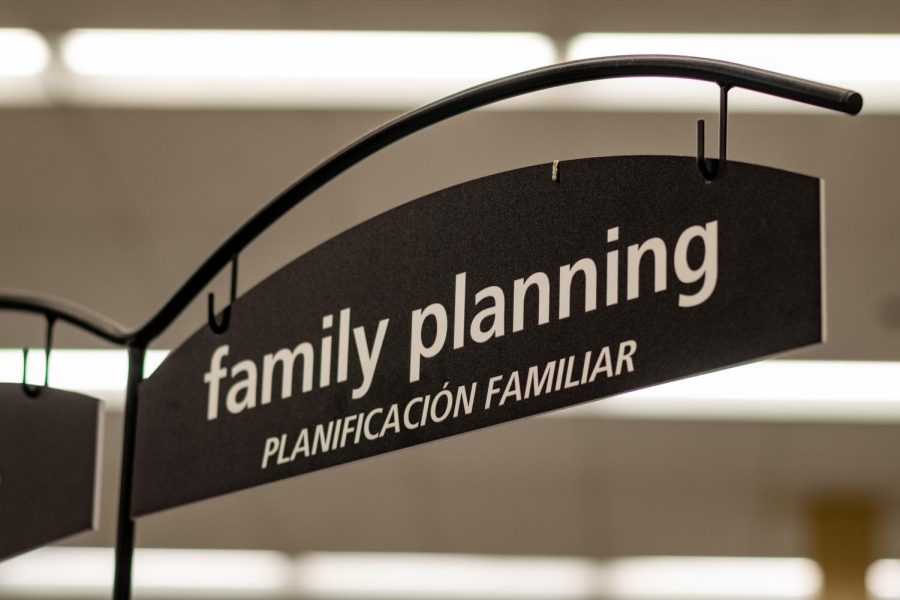Soter: All Utah Women Deserve Access to Contraception
The family planning section at Smith’s grocery store on 400 S in downtown Salt Lake on Feb 7, 2021. (Photo by Jack Gambassi | The Daily Utah Chronicle)
In an interview about her bill H.B. 102 — “Contraception for Inmates” — Rep. Jennifer Dailey-Provost told me a story. After the bill was first drafted, she received a memorable question from a sheriff in rural Utah. He wondered if giving incarcerated women access to birth control would prompt incarcerated men to demand access to erectile dysfunction medication. “I was absolutely stunned,” Dailey-Provost said. “It was a good thing that I was sitting in my office reading the email because I think my jaw hit the floor.” In case it’s unclear why the legislator reacted that way, let me clarify: birth control and erectile dysfunction medication are completely incomparable. Erectile dysfunction medication is not fundamental healthcare. Birth control is, and it deserves to be treated as such.
As of 2018, 18% of all women in Utah jails had used a hormonal form of prescription contraception in the year prior to arrest. Despite this statistic, Utah jails prohibit the continuation of birth control methods upon incarceration, which may lead to unplanned pregnancies for many women who are not financially, emotionally or physically equipped to have a child. But Dailey-Provost and Sen. Luz Escamilla are on the road to righting this wrong by sponsoring legislation that treats birth control as the basic form of healthcare it is — making it accessible to incarcerated women in our state. In doing this, these two women legislators are paving the way to a more humane criminal justice system and a more humane Utah.
H.B. 102 has been in the works since Dailey-Provost joined the Utah State Legislature in 2019. Since then, the bill has been changed and amended many times, leading to the nearly accepted and complete piece of legislation that it is today. The bill began as a way to distribute contraception that Utah inmates had taken prior to incarceration, but it was blocked due to misunderstandings about the need for the bill and its fiscal requirements. From there, it was sent to interim study and evolved into a women’s healthcare sub-section of a workgroup that strived to reform Utah jails in other ways. That group proved successful, and a policy was put in place requiring that all female inmates would, at minimum, be asked about their medical history with contraception during mandatory inmate healthcare screening. While there was no certainty that the continuation of contraception would actually be provided to inmates, the discussion of the topic planted a seed within Utah’s jails that Dailey-Provost and Escamilla are determined to help grow.
Today, the passing of H.B. 102 is dependent on whether or not Utah lawmakers will agree to the bill’s $88,500 fiscal note — though Dailey-Provost said that estimate may not be totally precise. “I question the assumptions in it, and I can’t imagine that it’s actually going to be that much,” she said. Still, even if the financial estimate is accurate, passing the bill is still more fiscally responsible than the alternative.
For one thing, family planning has a return investment of $7.09 for every public dollar spent — and 43% of births in the US are financed by Medicaid. Each birth can cost nearly $13,000 while contraception for a single woman would only cost taxpayers $239 annually. The numbers don’t lie. Prevention prevails.
More importantly than the financial costs, though, providing contraception to inmates will significantly decrease the chances of pregnancy for incarcerated women. If women who are on birth control prior to arrest don’t have access to their form of contraception while incarcerated, even for a short time, the risk of unplanned pregnancy resulting from sexual intercourse prior to incarceration dramatically increases. These scenarios are detrimental to women’s ability to stabilize after arrests, especially since 72% of incarcerated women nationwide experience poverty. And of course, many women take contraception for other health concerns. In fact, 1.5 million women in the US alone use birth control for non-contraceptive reasons. Birth control can help treat menstrual disorders, anemia, endometriosis and many other very real and very painful diagnoses.
Utah jails currently fail to follow the humane national standards set for incarcerated women by the American Public Health Association and the National Commission on Correctional Health Care. Both organizations agree that providing contraception to inmates is integral to maintaining human rights within the criminal justice system. Professionals know that birth control is as much a form of healthcare to women in the criminal justice system as insulin is to incarcerated diabetics. Providing incarcerated people with the healthcare they need — whether it’s mental illness medication, substance abuse treatment or contraception — is a critical step in reforming the criminal justice system. And H.B. 102 is a sure way to get us off on the right foot.
As Rep. Dailey-Provost put it, denying women inmates access to contraception is “inefficient health care, and it’s bad medicine.” Utah women deserve better.



